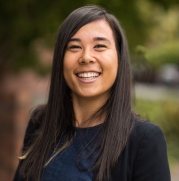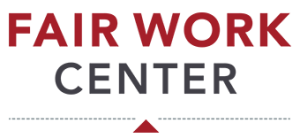Fair Work News, December 2016
FAIR WORK NEWS
Hello and welcome to the inaugural edition of the Fair Work News, our new quarterly e-newsletter!
 We at Fair Work Center are excited for the new year and the incredible work to raise standards for workers that is underway in our region, despite our concern for workers’ rights at the federal level under a new President and new Labor Secretary. We know we have our work cut out for us protecting the gains workers made over the past eight years, and as we begin 2017 we do so with the belief that our work is more important than ever.
We at Fair Work Center are excited for the new year and the incredible work to raise standards for workers that is underway in our region, despite our concern for workers’ rights at the federal level under a new President and new Labor Secretary. We know we have our work cut out for us protecting the gains workers made over the past eight years, and as we begin 2017 we do so with the belief that our work is more important than ever.
In 2016, Fair Work Center talked to more than 9,000 workers about their employment rights, helped recover tens of thousands of dollars in unpaid wages and supported dozens of wrongfully-terminated workers get their jobs back.
In the coming year, we plan to expand our outreach and education efforts by growing the Fair Work Collaborative and expanding our reach beyond King County. This year there are two new labor standards for workers in Seattle in specific industries – new minimum standards for hotel workers and secure scheduling for food service and retail workers (beginning July 1, 2017) – as well as a new statewide minimum wage and paid sick and safe leave time for all workers. Despite the direction that our country may be headed, the Pacific Northwest will continue to lead the way in raising standards for workers.
In this first edition of the Fair Work News, we bring you:
- Fair Work Center’s 2016 Annual Report
- Case briefs from the Fair Work Legal Clinic
- Interviews with Founding Donors to learn they support FWC
- Upcoming events: Sing Into Spring with Fair Work Center – March 23, 2017, The Royal Room
Thank you for supporting Fair Work Center. Please enjoy the Fair Work News and happy new year from everyone at Fair Work Center.
In solidarity,
Nicole Vallestero Keenan
Executive Director
2016 Annual Report
We are excited to share our first Annual Report. The report covers a bit about where we came from and what we do, as well as highlights stories from some of the workers we support and our partners in the Fair Work Collaborative.
Please check out Fair Work Center’s 2016 Annual Report
Fair Work Legal Clinic Case Briefs
Below are a sampling of cases that have come in to the Fair Work Legal Clinic. Names and other identifying information have been changed to protect the privacy of these workers.
Intake Cases
Abdirahman recently arrived in King County as a refugee from Somalia. Somali Community Services, a Fair Work Collaborative partner, referred Abdirahman to Fair Work Center after he was offered a job as a security guard only to have it rescinded. A routine background check falsely reported he had criminal convictions from another state. Abdirahman needed that job and he knew it was a case of mistaken identity. The same day he came into the Fair Work Legal Clinic, we accompanied him to the King County Courthouse and cleared his record. Abdirahman didn’t need a lawyer, he needed an advocate, and he found one at the Fair Work Legal Clinic.
Leticia worked as a delivery driver for a small company that contracts with Amazon to make its Prime deliveries. Leticia was injured on a delivery and discovered that because her employer treated her as an “independent contractor,” she was not entitled to Workers’ Compensation. She was also paid substantially below minimum wage. The Legal Clinic helped Leticia sort out her Workers’ Compensation paperwork and find a lawyer to support her case. The Legal Clinic also referred her case to the US Department of Labor, which is investigating the minimum wage problems.
Chelsea worked for a manufacturing company in Seattle. After becoming pregnant, her doctor said that she needed light duty work assignments or risk a miscarriage. Chelsea’s employer told her that light duty was reserved for workplace injuries and not available for pregnancy. Chelsea was left without a job and was forced to move in with her mother in Alabama. Worse, she lost the baby. She knew her employer was in the wrong and that there must be something she could do. She came to the Fair Work Legal Clinic after exhausting every other possible route. The Legal Clinic persuaded the Washington Attorney General to take the case on and file a lawsuit against Chelsea’s employer.
Community Clinic and Direct Representation Cases
Maria worked for a dry-cleaning company on the night shift. She became sick and was not able to go into work. Upon calling in sick, her manager told her to “not bother coming back in” and withheld her final paycheck. Maria knew this wasn’t right and came to Fair Work Legal Clinic seeking support. The Legal Clinic took on individual representation of her case and demanded payment of that final check. We were successful in getting Maria paid and continue to pursue additional penalties and remedies for retaliation.
Kim is an immigrant from Korea who worked as an assistant to a hairdresser. She answered phones, greeted customers, swept up hair, and provided tea and snacks. She worked 45 hours per week but was paid just $1,000 per month, less than $5.50 per hour. Her employer thought that she could take advantage of Kim’s uncertain immigration status and her desire to break into the personal care industry, telling her that she was not an employee but an “independent contractor.” Kim knew this was unfair and was referred to the Legal Clinic by 21 Progress, one of our Fair Work Collaborative partners. The Clinic took on representation of Kim and filed a charge on her behalf, which is currently under investigation by Washington’s Department of Labor and Industries.
Jose worked as a painter for a large construction firm. The firm told Jose that he was an “independent contract” and, therefore, not entitled to any overtime. Jose found a lawyer to sue the employer for wage theft, but the lawyer abandoned the case, leaving Jose to navigate the court system on his own. After Jose did not respond to one of the employer’s motions, the suit was dismissed and fines were imposed on Jose. He sought help from other lawyers without success. The Legal Clinic has been able to negotiate with the employer to resolve the case and help Jose recover some of his losses.
Interviews with Founding Donors
Fair Work Center is incredibly grateful to our Founding Donors: SEIU 775, Breskin Johnson & Townsend, Terrell Marshall Law Group, Schroeter Goldmark & Bender, and Frank Freed Subit & Thomas. These organizations have all contributed or pledged significant gifts over multiple years to help get Fair Work Center up and running and to put us on a path toward financial sustainability.
In this newsletter we bring you interviews with Dan Johnson of Breskin Johnson & Townsend, Toby Marshall of Terrell Marshall Law Group, ____ of Schroeter Goldmark & Bender, and Mike Subit of Frank Freed Subit & Thomas to get a sense of why their firms stepped up to support Fair Work Center and the Fair Work Legal Clinic.
Why did you choose to practice employment law?
DJ: “I worked at the Employment Law Center in San Francisco in law school, and also volunteered at the workers’ rights legal clinic at my school in Berkeley California, where I went to law school. From there, I knew I wanted to do employment law, and I knew I wanted to work on the employee side. My values have always been to look out for the little guy.
What are some challenges you see for workers today?
DJ: “So often the employer has all the resources on their side. What we see happening more and more in cases we represent is employers using their resources to take unreasonable stands, dig in their heels and stretch things out as long as possible, trying to wear down the employee or employees making a claim. These cases impact employees’ entire livelihood – it’s about their jobs and how they support their families – but they get fought for a long, long time. And I think sometimes justice delayed is justice denied.”
What change would you like to see to improve the welfare of all working people?
DJ: So many things! This legal clinic is one. I think there are dozens of people walking around in every neighborhood in this city that every day have some sort of legal issue in their workplace. Most of them probably never get any legal support. So community clinics like this one are great opportunities for people to get their questions answered and hopefully to get some relief for wrongs they experienced. Another is the minimum wage. Thankfully we’ve raised it here in Seattle and now Washington, but we’ve got a long way to go in most places around the country.
Why does your firm support Fair Work Center?
DJ: “Since I moved back to Seattle after law school, I really wanted to see something like the the Worker’s Rights Clinics in California started here. But I couldn’t do it on my own and was too busy trying to build my own firm. So, I am really excited it has finally happened here with the Fair Work Legal Clinic.
There are so many people walking around with questions about their work or problems in their workplace that could probably be resolved if the right connections were made. I think that’s what the Fair Work Legal Clinic is doing, connecting people with answers and solutions to the problems they are having at work. And the bigger impact the Legal Clinic can have is that employers may be more inclined to do the right thing knowing that their employees now know their rights and have access to free legal services.”
Toby Marshall

TM: “I grew up in a working-class family, and I know what it’s like to live paycheck to paycheck. I also know that employers hold a great deal of power over employees. These circumstances leave many workers vulnerable to wage and hour abuses. One of my first cases as a lawyer involved a large company that regularly required its employees to work several hours without pay each week. The employees tolerated this for years because they were afraid to lose their jobs, which would mean losing their ability to put food on the table each day and pay rent each month. I practice employment law to fight for those who find themselves in this situation. Nobody should have to work without pay for fear of being unable to provide for his or her family.”
What are some challenges you see for workers today?
TM: “Workers face a variety of challenges, but one that seems to be on the rise is mandatory arbitration. Increasingly, employers are requiring workers to sign agreements with arbitration clauses that bar class and collective actions. The obvious goal is to prevent workers from banding together, to bar them from the courthouse, and to keep complaints confidential and violations hidden. Some courts have found such agreements to be illegal, saying they violate the right of employees to engage in concerted activity. Other courts, however, have allowed these agreements to stand (and ultimately serve as a get-out-of-jail-free card for employers).”
What change would you like to see to improve the welfare of all working people?
TM: “Greater access to justice. Wage theft is a serious problem in this country, affecting workers in all industries. One large-scale study found that two-thirds of the employees who were surveyed experienced at least one wage-and-hour violation in the previous workweek. The average wage loss per worker was 15 percent. Class and collective actions are helpful, but more resources are needed to assist individual employees who are being cheated on pay or subjected to unlawful working conditions. We are fortunate to live in a state that has strong wage and hour laws, but those laws don’t enforce themselves. Workers need advocates, whether it’s individual attorneys, agencies like Washington’s Department of Labor and Industries or Seattle’s Office of Labor Standards, or legal aid organizations like the Fair Work Center.”
Why does your firm support Fair Work Center?
TM: “The Terrell Marshall Law Group wants to support access to justice and to us, that’s what the Fair Work Center is all about. Our class action practice helps large groups of employees, but we know that’s only the tip of the iceberg. There are many other workers out there who aren’t getting any help whatsoever. By educating workers about their rights and providing them with greater access to the courts, the Fair Work Center is making it more likely that employers will do the right thing and follow the law.”
Mike Subit
 Why did you choose to practice employment law?
Why did you choose to practice employment law?
MS: Going into law school, I knew I wanted to practice some sort of civil rights or constitutional law when I got done. At the time, I would have guessed I’d go into a career with someplace like the ACLU. And I actually did work for the ACLU for a couple of years early in my career, but it was as a summer associate at a labor and employment firm in the Bay Area that I got a taste for plaintiff-side employment law. So I took more labor and employment courses and by the time I was done with law school and after two federal clerkships, I knew it was the area of law I wanted to focus my career.
For so many of us, our work is fundamental to who we are. When people are stripped of their rights at work or aren’t getting fairly paid for their work, it can be devastating for them and their families, both economically and psychologically. I’ve always felt that practicing employment law enables me to do that public interest work that I went to law school for in the first place.
What are some challenges you see for workers today?
MS: Elections matter. Changes in the courts matter. I have been through some different administrations, but we are now dealing with the greatest challenge we have seen since the New Deal. We are going to have an administration that will be the most anti-worker, anti-union administration since Calvin Coolidge. I think workers are in for a host of challenges – from gutting labor standards to attacks on unions to undoing some of the good work the Department of Labor has been engaged in under the Obama administration.
Thankfully we are in a region and a state with relatively strong laws for workers, so we will devote our time to improving lives of workers at state and local levels over the next few years.
What change would you like to see to improve the welfare of all working people?
MS: I would like to get rid of employment at will – the employment law principle that allows employees to be discharged for no reason. I believe ending it would help both employers and employees. It would improve both the appearance and the reality of fair treatment in the workplace. I would like to replace it with some sort of cause provision, similar to what you see in union contracts. I think it would help lead to faster resolutions for both sides, help avoid costly litigation, and, as we see among workers with cause provisions in their union contracts, it makes a big difference in the empowerment of workers to have greater control over your conditions at work.
Why does your firm support Fair Work Center?
MS: There are so many unmet needs in terms of resources for workers to exercise their rights, particularly fair wages. Private law firms don’t have enough lawyers to do the work, and even with the current system that encourages attorneys to take such cases on, a lot of cases still don’t make sense for a firm to take on financially. A clinic has different goals and orientations and can provide more resources to the people who need it and to people who might otherwise fall through the cracks. Also, we fully support the Legal Clinic’s role in training the next generation of lawyers that will devote their lives to help working people achieve their rights.


